Community Learning Research Fellows Present Fall 2023 Findings to Hartford
The Center for Hartford Engagement and Research is pleased to share the final research posters from the Fall 2023 Community Learning Research Fellows! The Community Learning Research Fellowship program is highly selective and allows students who have experience in community engagement to tap into their skills on a research and creative basis. This is done by creating projects that are of mutual benefit to the students and community partners by expanding their knowledge of community engagement and working with community partners to achieve their goals in Hartford.
With guidance from Colloquium Instructor Laura Holt, Teaching Assistant Anna Grant-Bolton ’25, Director of Community Learning Erica Crowley, peers, and community partners, fellows develop critical skills in research and learn more about community-based research. They develop their presentation and discussion skills and express with one another their challenges and successes. To further support and structure the projects for success, the program incorporates a shared expectations document that community partners, fellows, and faculty advisors contribute to at the start of the semester and fellows submit regular progress memos that are viewable by their instructor, faculty advisor, community partner, and peers.
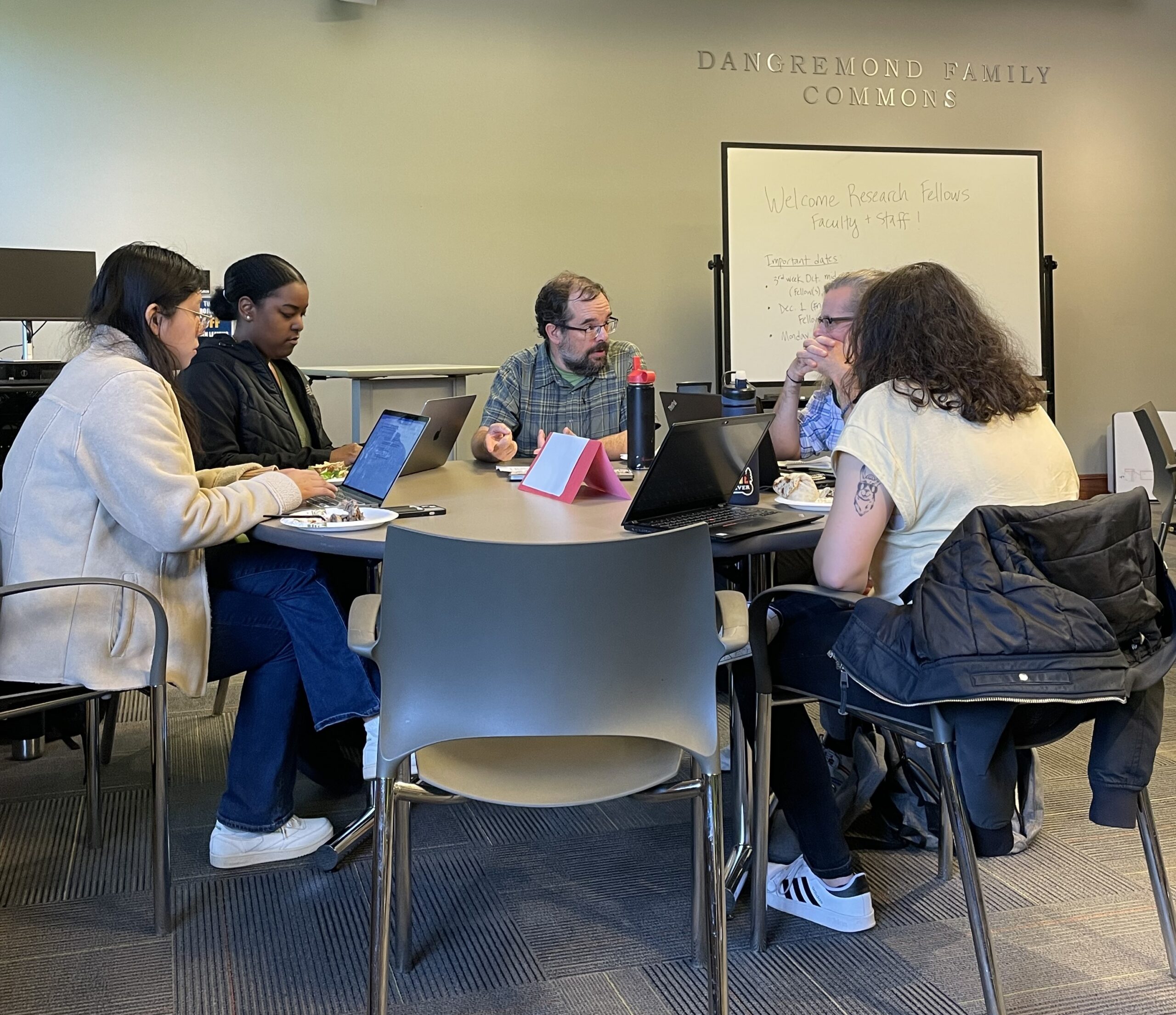
During the fall 2023 semester fellows attended weekly seminars covering a series of topics related to community-based research: identifying a question and designing a research project, communicating a research plan, developing good interviewing skills, analyzing and visualizing data, designing research posters and other products, and addressing challenges in collaborative projects. They were further supported through regular large group colloquium sessions where faculty advisors, peers, and key staff from across campus provided feedback on projects before the final poster conference.
We congratulate the fellows, faculty sponsors, and community partners for their work together this semester. We extend a special thank you to our guest evaluators Fionnuala Darby-Hudgens IDP ’13, Director of Data Strategic Planning at the Connecticut Data Collaborative, and Dr. Camilo Ruiz, Assistant Professor of Anthropology and the entire Center for Hartford Engagement & Research (CHER) team. This work is successful because of the various contributions and collaborations within our Hartford and the Trinity Community.
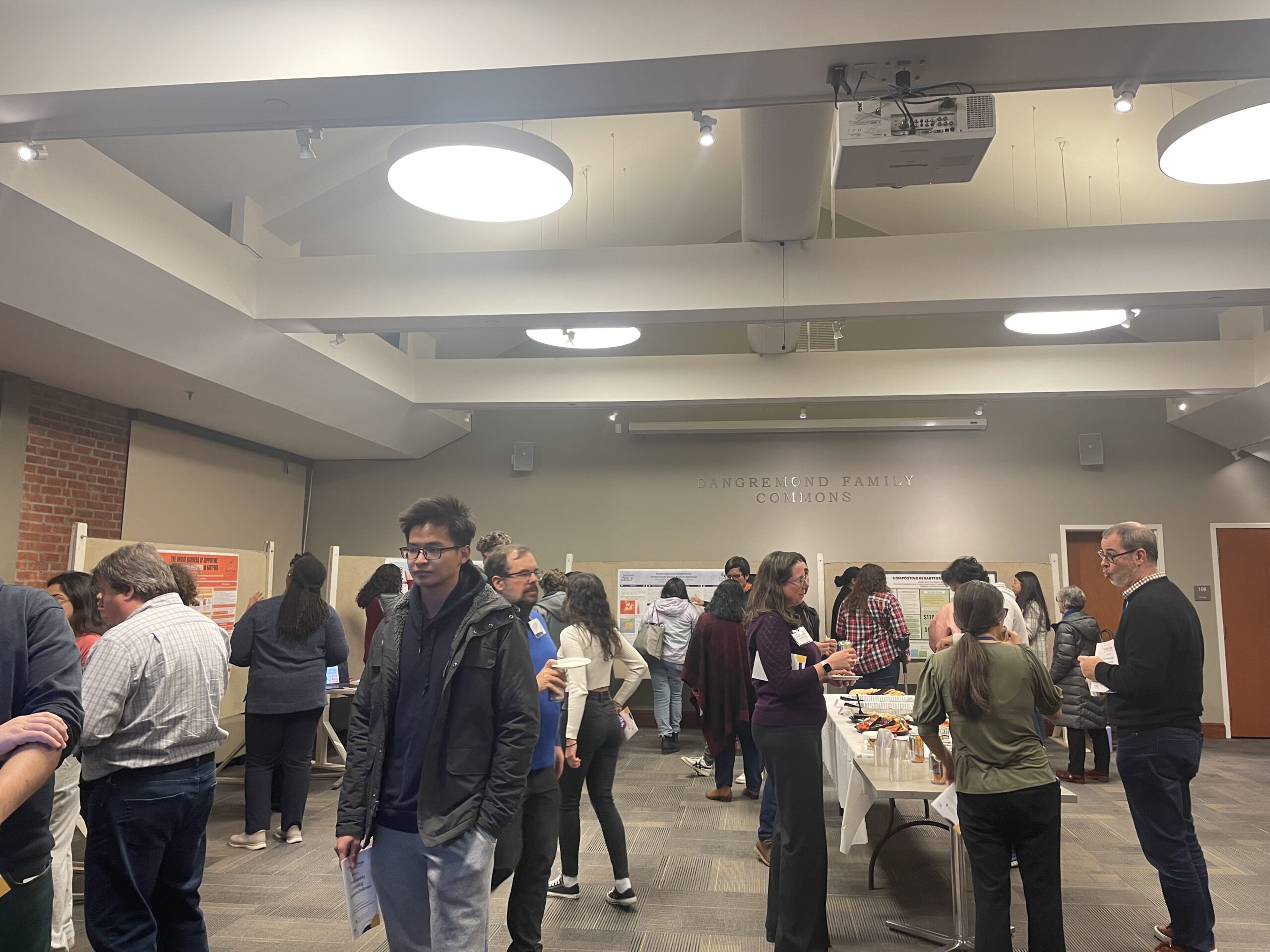
Language Positioning Within Peer Discourse in Dual Language Classrooms
Sophia Jones ‘24 and faculty sponsor Robert Cotto, Jr. with Dwight Bellizzi Dual Language Academy
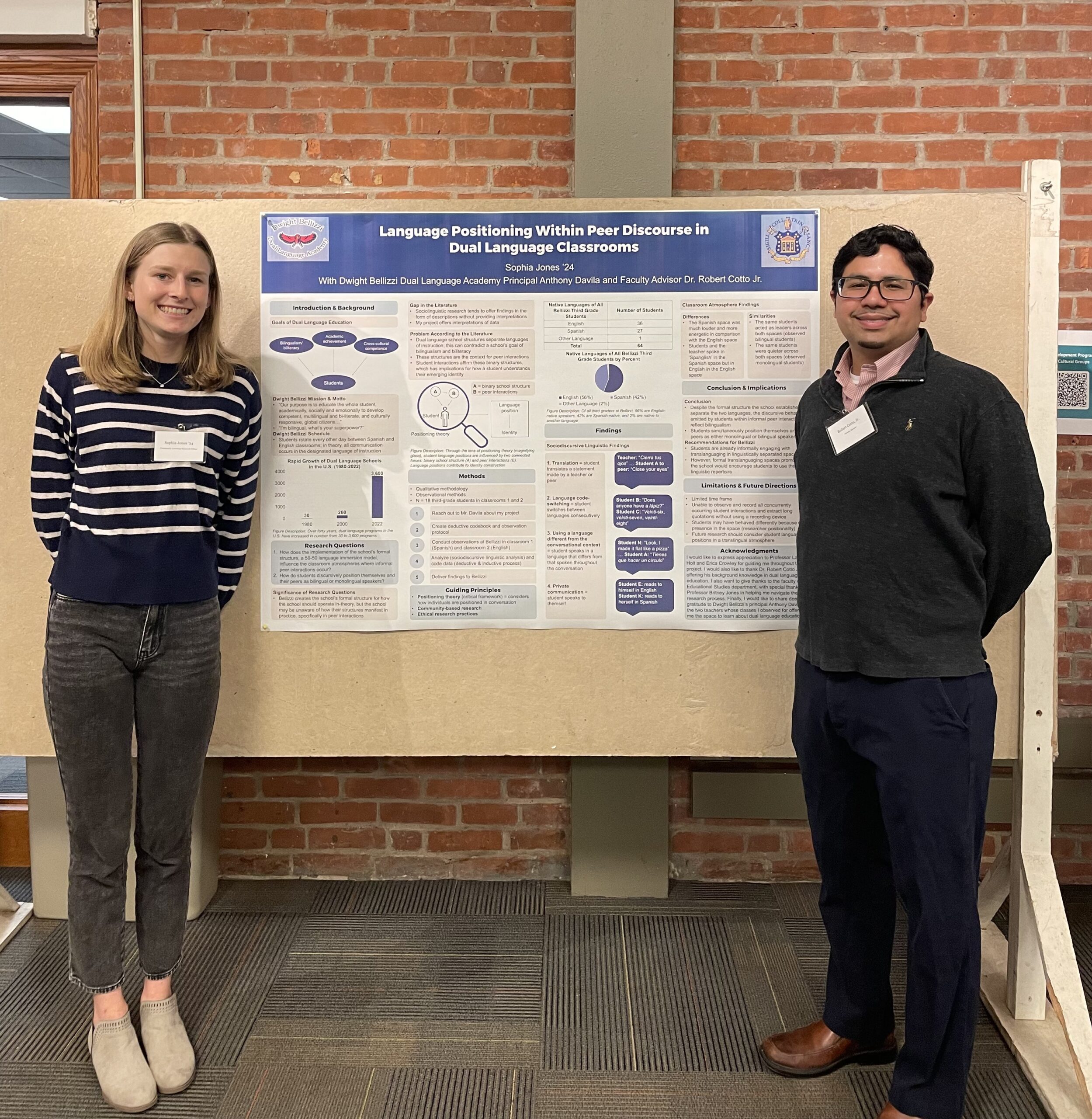
Abstract: Bilingualism and biliteracy represent one of the goals for dual language education, but prior research shows that the separationist manner through which programs are structured can contradict this goal. The purpose of this study was to explore discourse patterns in peer interactions; specifically, through the lens of a critical framework, how students are positioned as bilingual or monolingual speakers in peer interactions. To gather data, observations of 18 third-grade students (ages 7-8) enrolled at the Dwight Bellizzi Dual Language Academy in Hartford, Connecticut were conducted over a seven-week period in two classrooms with different languages of instruction: Spanish and English. During observations, descriptive field notes were collected and ultimately analyzed at a broad level to contextualize the atmosphere in which peer interactions occurred. Discursive analysis of peer interactions revealed four themes in which elements of bilingualism are present in each: translation, code-switching, using a language different from the conversational context, and private communication. These themes point to the nuance of bilingualism in the context of a dual language school.
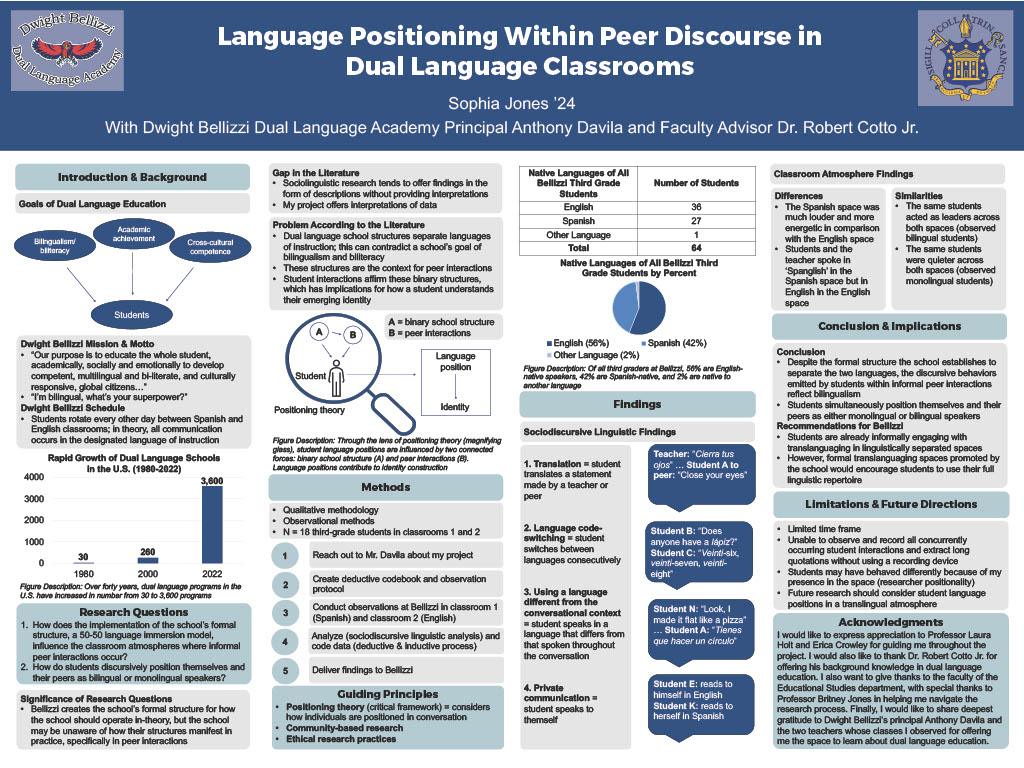
Parent Experiences Navigating the Hartford Youth Scholars Program Application
Maria Vicuña ‘24 and faculty sponsor Britney Jones with community partner Hartford Youth Scholars
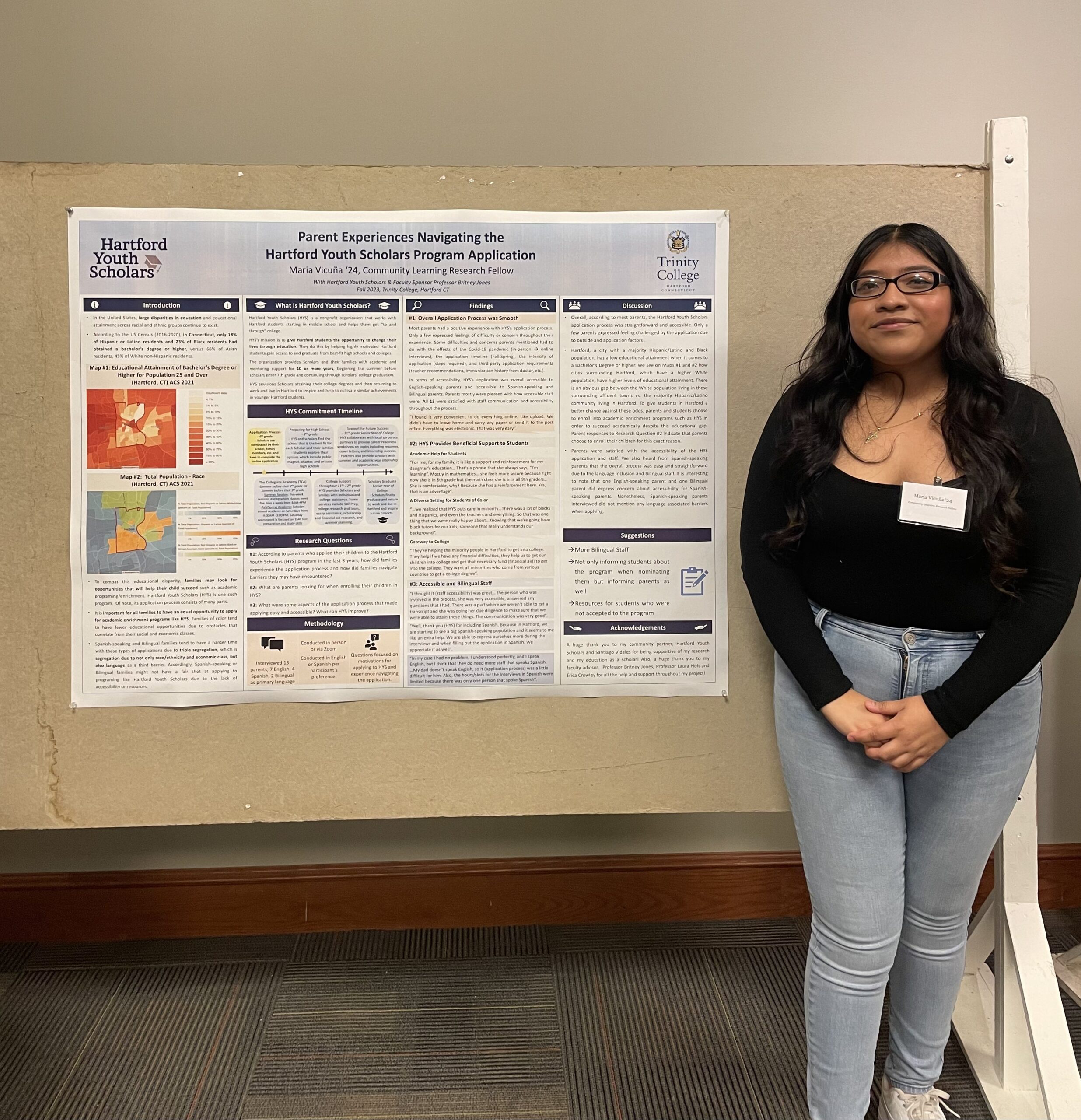
Abstract: In the United States, large disparities in education and educational attainment across racial and ethnic groups continue to exist. To combat this disparity, families may look for opportunities that will help their child succeed such as academic programming/enrichment. Hartford Youth Scholars (HYS) is one such program, located in Hartford, CT. While programs such as HYS exist, these programs are usually in demand and unfortunately, due to lack of resources and funding, there are only a limited number of students programs are able to admit. While this is the case, it’s important that all families have a fair shot at applying. Through this qualitative study, I interviewed 13 parents in both English and Spanish and asked them questions pertaining to their experience navigating the HYS program application and the accessibility of the application. Based on my analysis of parent interviews, HYS’s application was overall accessible to English, Bilingual, and Spanish-speaking parents. Although a few parents voiced concerns and difficulties throughout the application, I believe that parents have overcome these difficulties through their motivations for applying to HYS and through the help of supportive and accessible staff within the program.
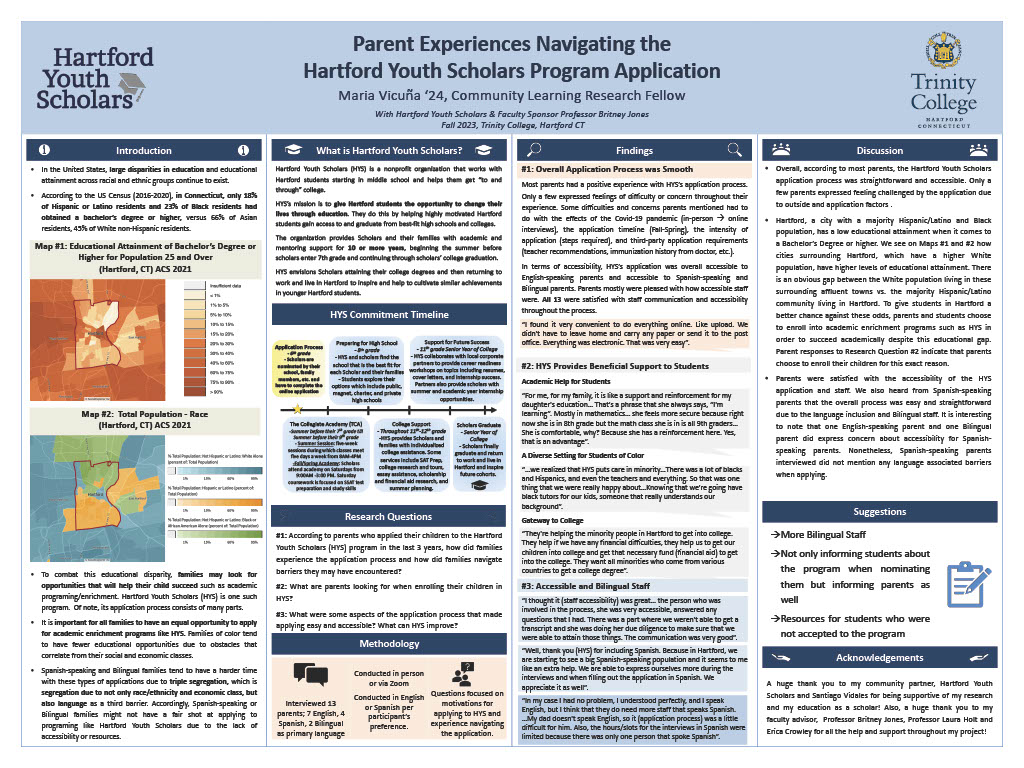
Gender-Inclusive Language and Student Engagement in the YWLC Leadership Corps
Claire Sabbe ’24, Maria Markosyan ’26 and faculty sponsor Blase Provitola with community partner YWCA Hartford
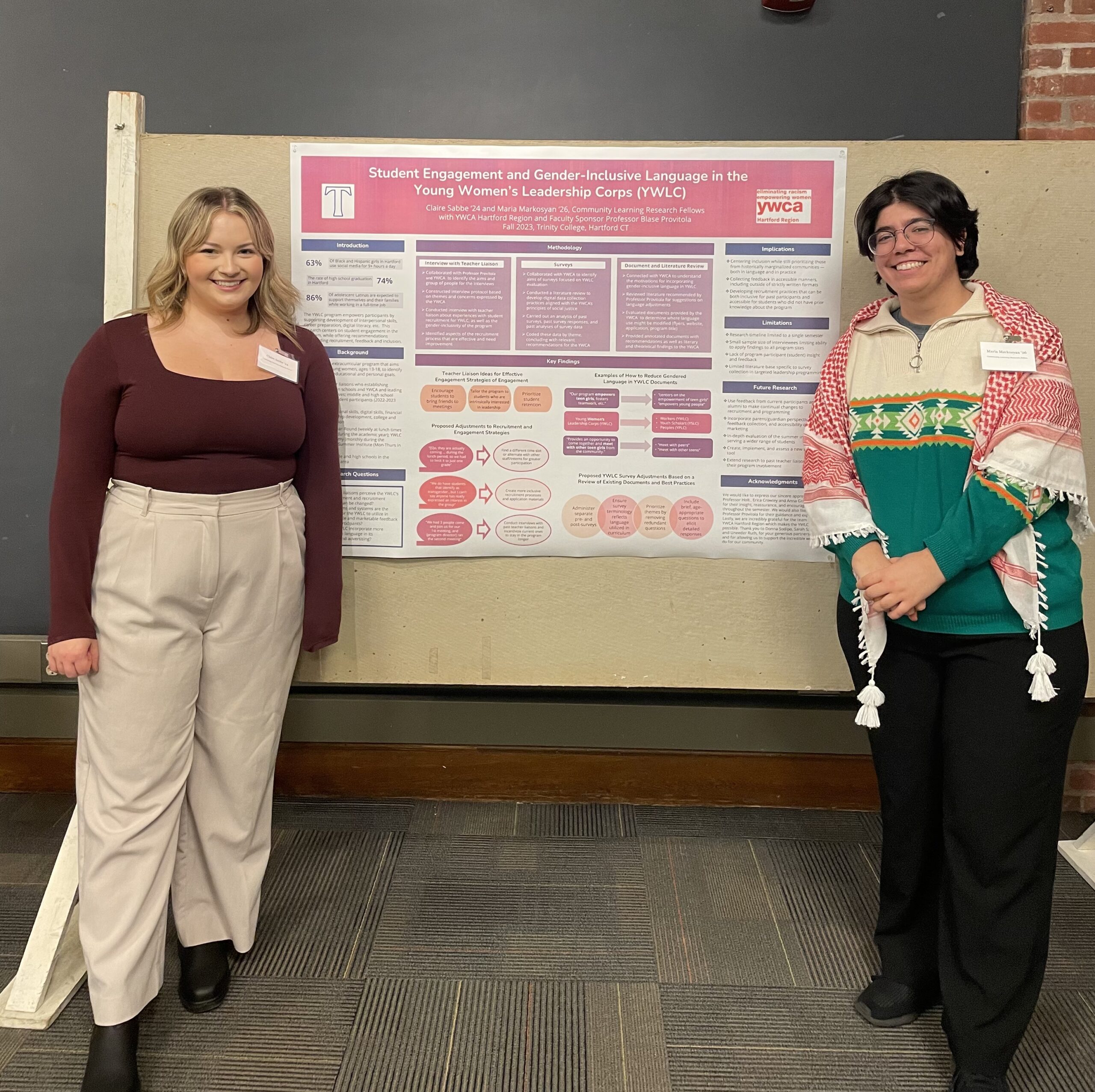
Abstract: Fostering the leadership potential of young people, particularly young women, is essential for the future of our communities. The YWCA offers a free program, the Young Women’s Leadership Corps (YWLC) for local middle and high school students, to aid in their development of essential skills including: interpersonal communication, financial and digital literacy, and career and college preparation. To support student engagement by understanding the best practices regarding student feedback, student recruitment, and the incorporation of gender-inclusive language, we collected qualitative data in numerous forms. Through interviews with teacher liaisons (who are responsible for the implementation of the curriculum at school sites), the importance of both targeted strategies for retention, and broad accessible outreach to support successful recruitment efforts were underscored. Next, utilizing explorations of best practices and document analysis, the feedback process was examined with recommendations surrounding the accessibility of language used in survey tools, and the separate administration of pre-surveys and post-survey. Lastly, through document analysis, suggestions for the implementation of gender-inclusive language were provided, noting the complexities of centering inclusion while still prioritizing those from historically marginalized communities — both in language and in practice. These findings have implications for the YWCA, for students and staff involved in the YWLC program, and for those engaged in work centered in youth empowerment.
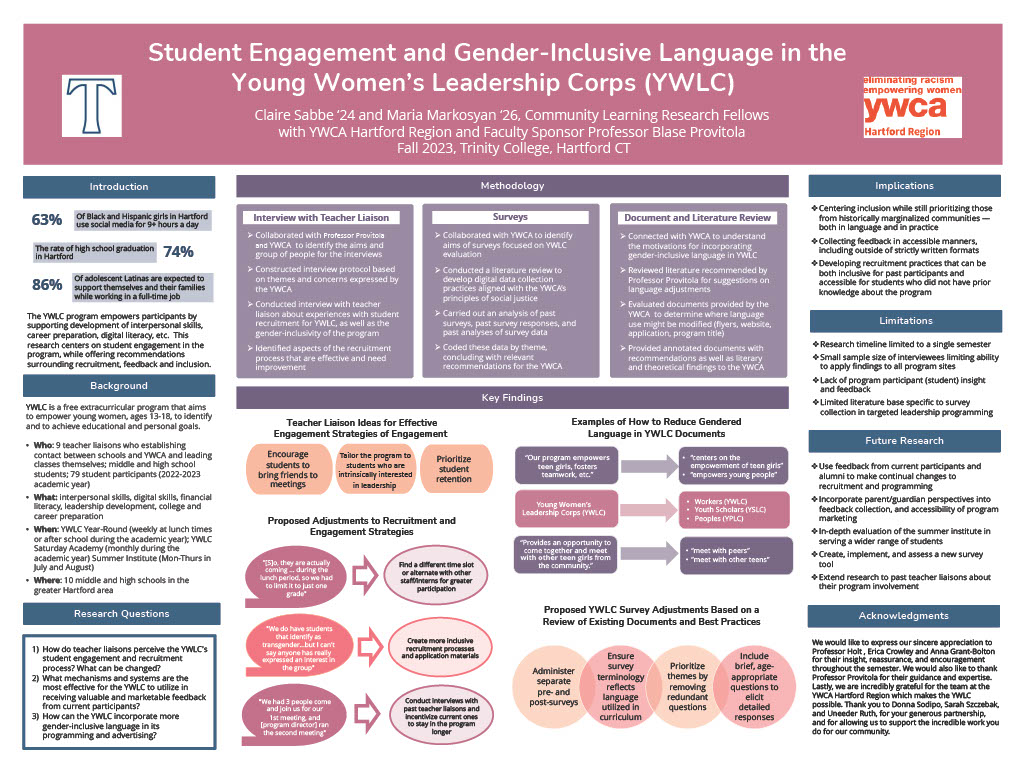
Race and Equity in Education: School-Based Equity Teams Recruitment Process
Jessica Cruz ’26, Linnea Mayo ’26 and faculty sponsor Stefanie Wong with community partner RE-Center
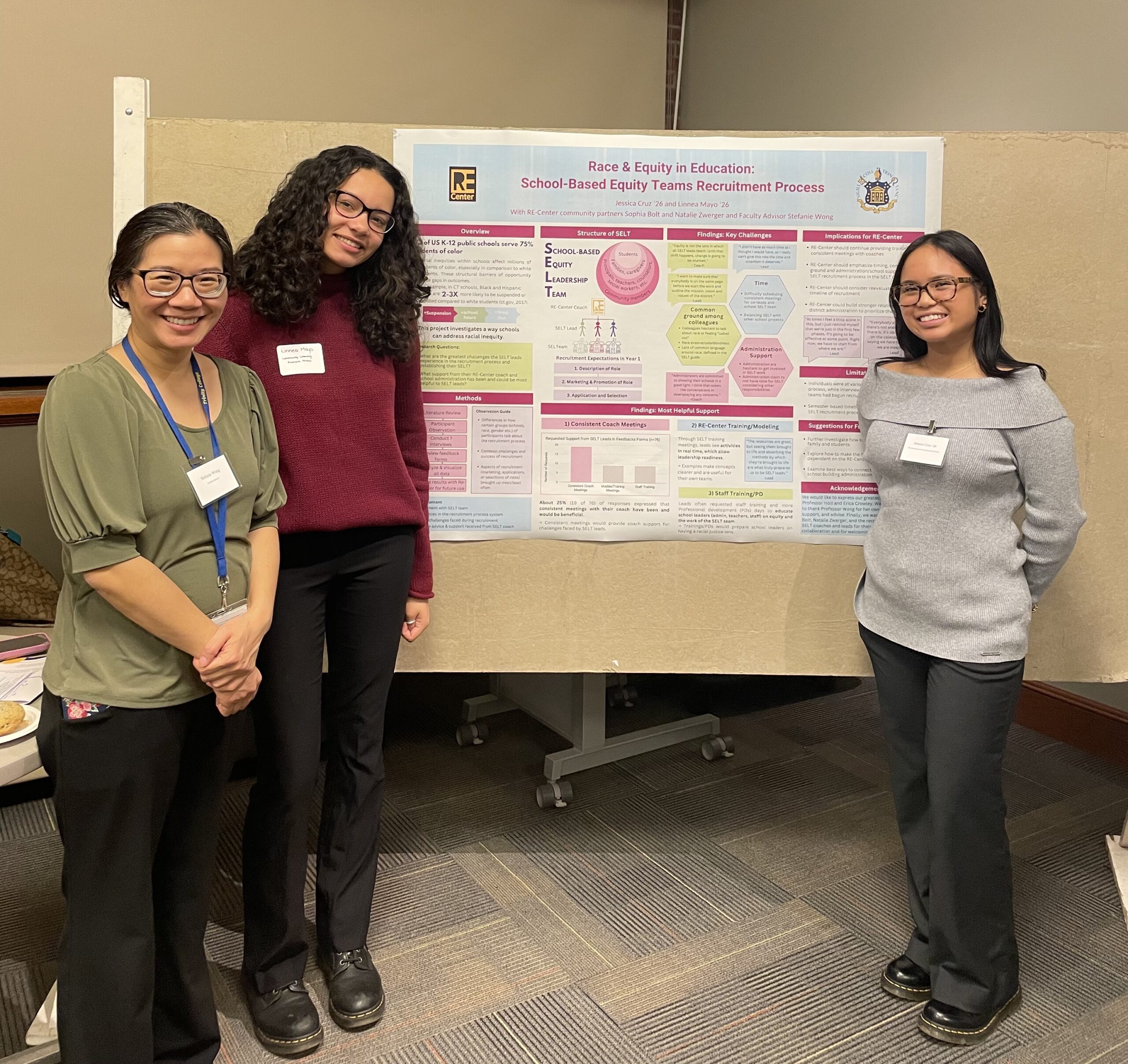
Abstract: Efforts to address racial injustice in education that affect millions of students of color is integral to creating equitable school communities. RE-Center is a non-profit for racial equity in education based in Hartford that has initiated school-based leadership teams (SELT) in a medium-sized CT urban school district. School leaders and RE-Center coaches have started their initiative through training and recruitment. Our research focused on the experiences and support of the team leaders. Using a qualitative research design, we analyzed feedback forms from SELT monthly trainings, conducted interviews with SELT leads and coaches, and monthly training observations to determine challenges in recruitment processes and identify needed support. We found that the greatest challenges SELT leads faced in recruitment was time, common-ground, and administrative support. The most requested support included having models and examples, consistent coach meetings, and staff training. These findings suggest that the RE-Center should further emphasize challenges in the SELT guide, consider reevaluating the expected timeline for recruitment, and build stronger relationships with administration.
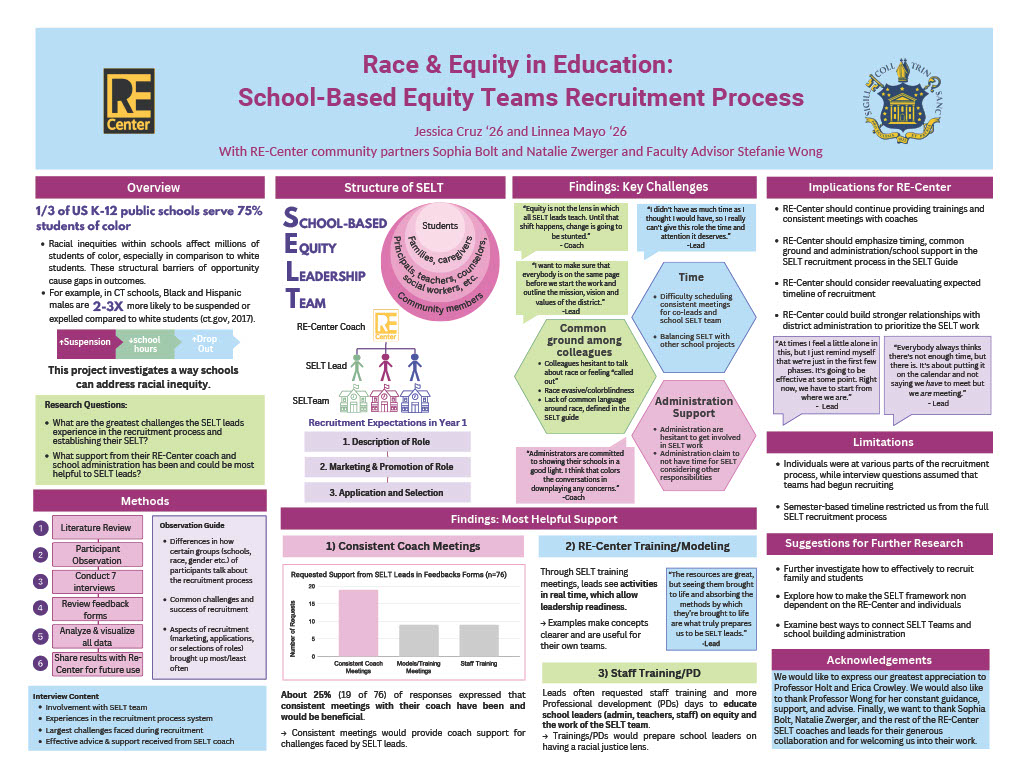
Composting in Hartford Public Schools
Shelby Carranza ’24 and Essence Smith ’24 and faculty sponsors Joe Barber and Hayley Berliner with community partners Hartford City Councilors Josh Michtom and Tiana Hercules and Councilor Aide Renato Muguerza Calle
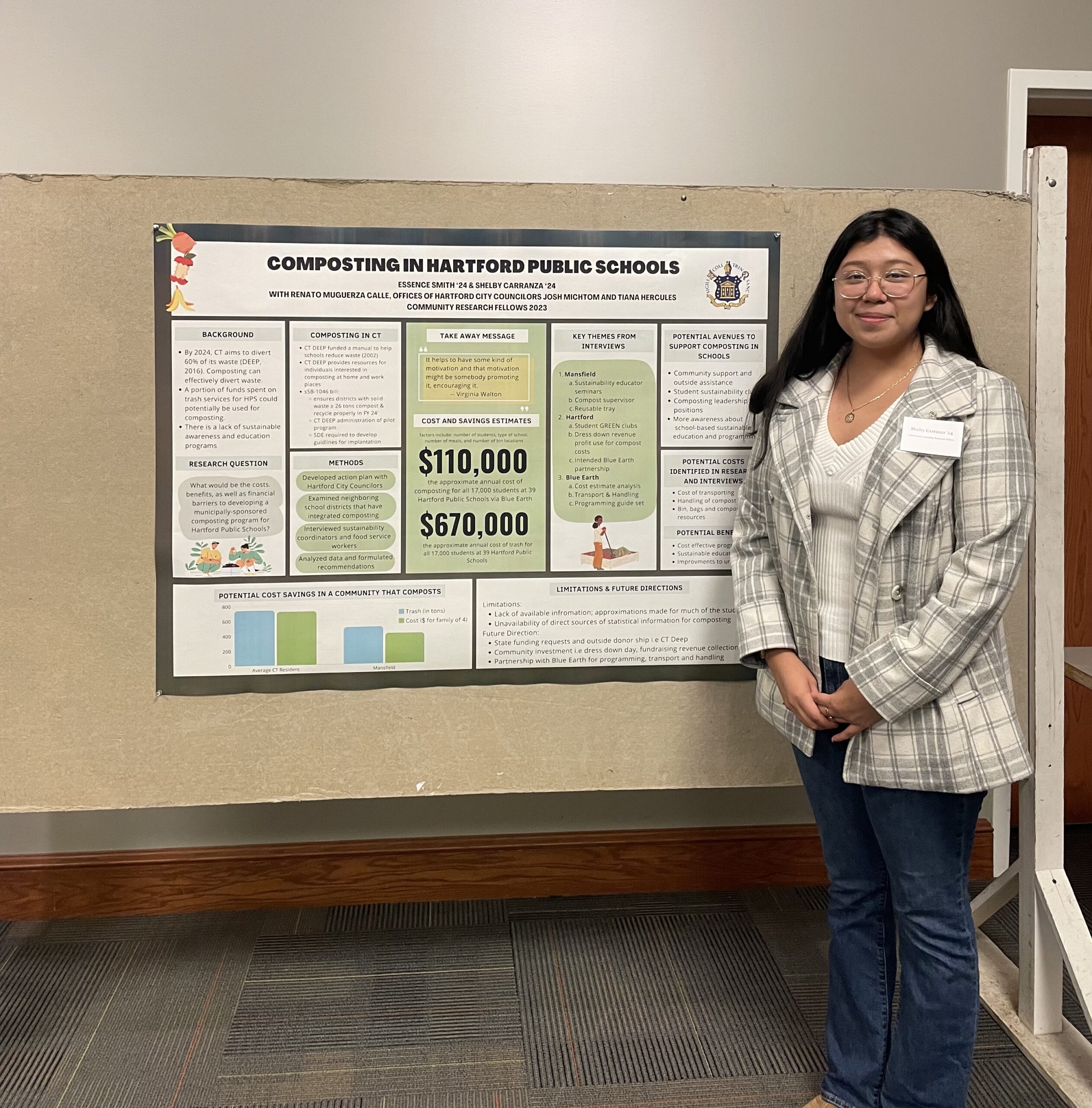
Abstract: Urbanization has been increasing globally and this increase has led to severe environmental consequences. One particular consequence we would focused on in our project is the correlative increase in food waste. Food waste is being generated at a rapid rate and will soon be beyond the capacity of management. When food waste is not sorted properly it inevitably ends up in landfills, which largely contributes to greenhouse gas emissions and increases landfill gas generation potential. There is a limited amount of land available, so it is in the interest of cities to reduce land usage to achieve this mission. It is important that municipal authorities begin proactively integrating food waste sorting methods to prevent adverse impact on the environment, human health, and quality of life in urban settings. The costs of the introduction of a food waste management on a municipal level has not been researched widely. This lack of information is why we decided to conduct a research project on what a program would need to be successfully established in the Hartford Public schools system. In our project we explored the question, “What would be the total cost benefits, as well as financial barriers to developing a municipally-sponsored Composting program for Hartford Public Schools?”
Our approach used mixed methods from reading articles found online to interviewing sustainability coordinators in neighboring Hartford schools. By focusing on school districts in Connecticut that were composting, we were able to gain insight into the process, allowing us to come up with a proposal for Hartford Public Schools. In addition to meeting with sustainability coordinators, we also met with Blue Earth, a food scraps collection carrier, to obtain an estimate for composting in all 39 schools within Hartford. We were able to approximate the total costs for a composting program in Hartford Public Schools to be approximately $110,000, according to Blue Earth. To offset these costs our interviewers from Mansfield and Hartford provided ideas to cover material costs, like reusable school lunch trays, through state grants. For other costs, such as bins and transport of food waste, schools such as Annie Fisher had dress down day to help cover composting program costs. In conclusion, we found that aspects of composting in other locations could likely be applied in Hartford Public Schools.
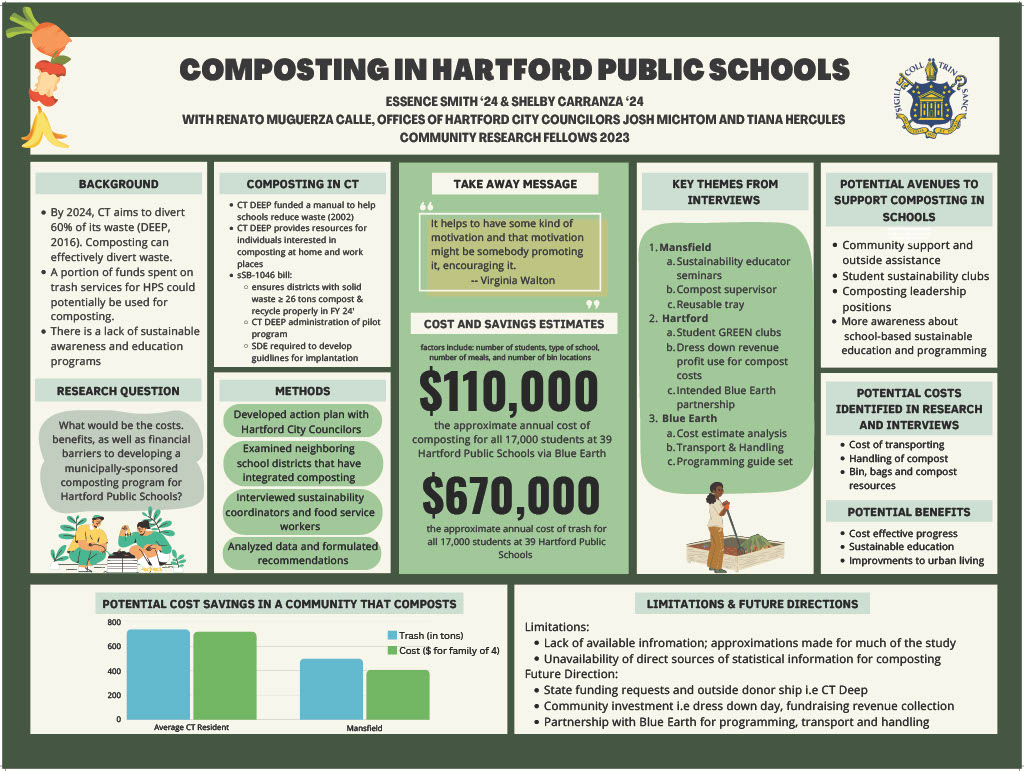
Sexual Violence Prevention in Behavioral Health Programming
Gabbie Marcuccio ‘26 and faculty sponsor Kelly Dugan with community partner InterCommunity
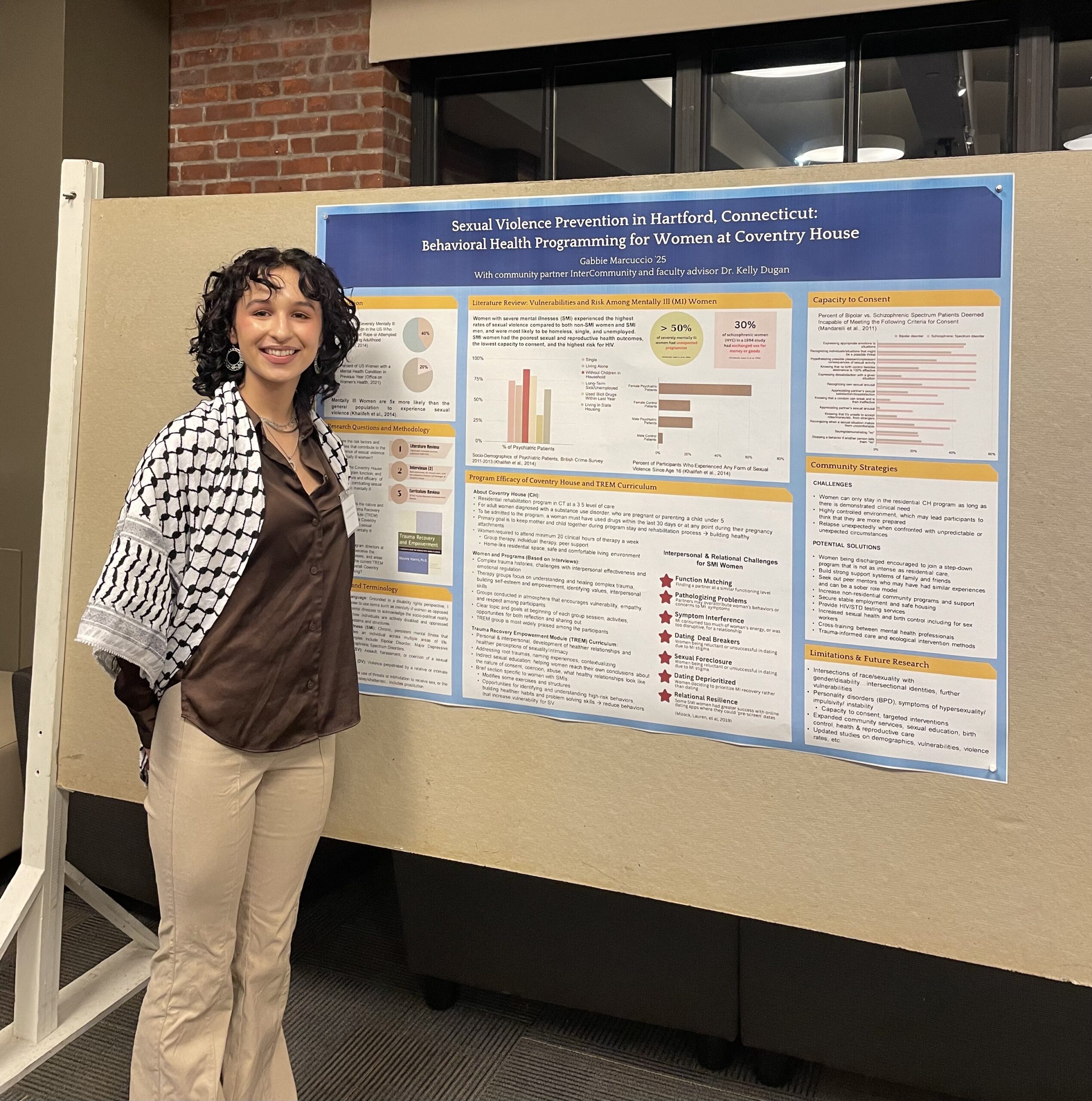
Abstract: Women with severe mental illnesses (SMI) experience the highest rates of sexual violence compared to both non-SMI women and SMI men. SMI women are also more likely to be homeless, single, and unemployed — socio-demographic vulnerabilities that are linked to higher rates of sex-trading, domestic violence, and poor overall sexual and reproductive health outcomes. My research investigated current literature to further identify the vulnerabilities and risk factors that contribute to such high rates of sexual violence against SMI women. I also interviewed program managers at Coventry House (a maternal substance abuse rehabilitation program within InterCommunity) to understand the efficacy of residential trauma-centered care, and curriculums such as the Trauma Recovery Empowerment Module (TREM), in reducing sexual violence through strengthening interpersonal effectiveness and trauma-management skills. From this research, identified strategies for reducing sexual violence against SMI women include expanded sexual education services and access to contraception, resources for securing stable housing and employment, greater cross-training between mental health and sexual violence prevention professionals, and strengthening interpersonal effectiveness and community support systems.
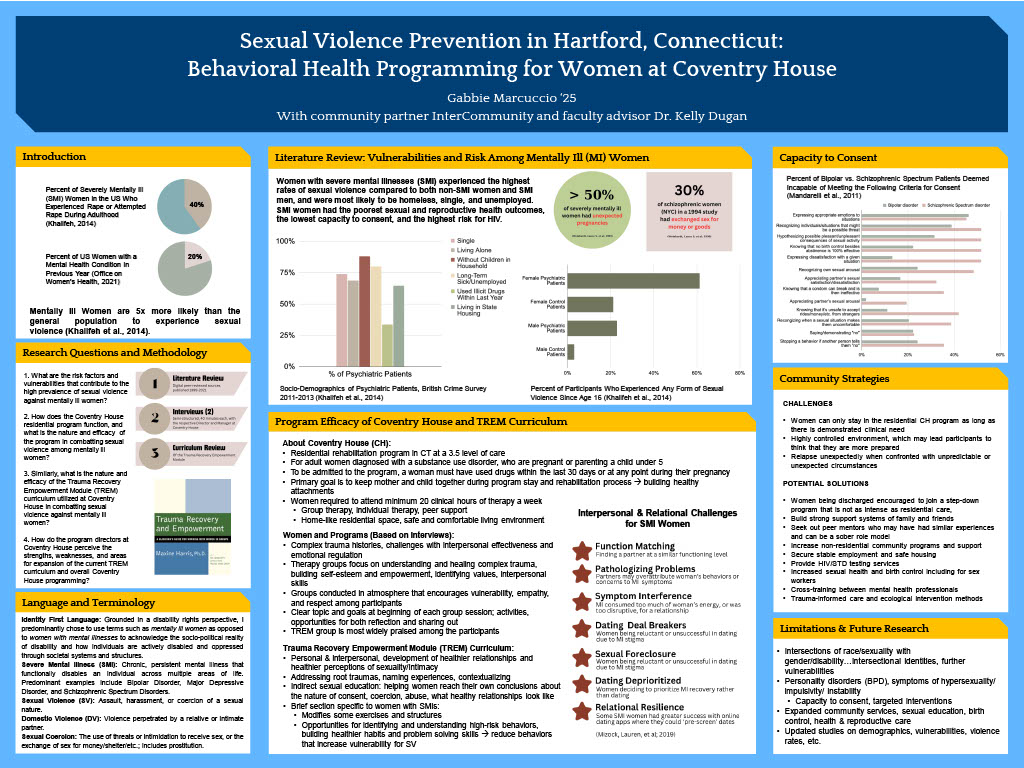
The Unique Barriers of Social Acclimation for Youth African Refugees in Hartford
Hannah Neo Khambule ’26 and faculty sponsor Kifah Hanna with community partners at the Swahili Community Center and IRIS, Integrated Refugee and Immigrant Services
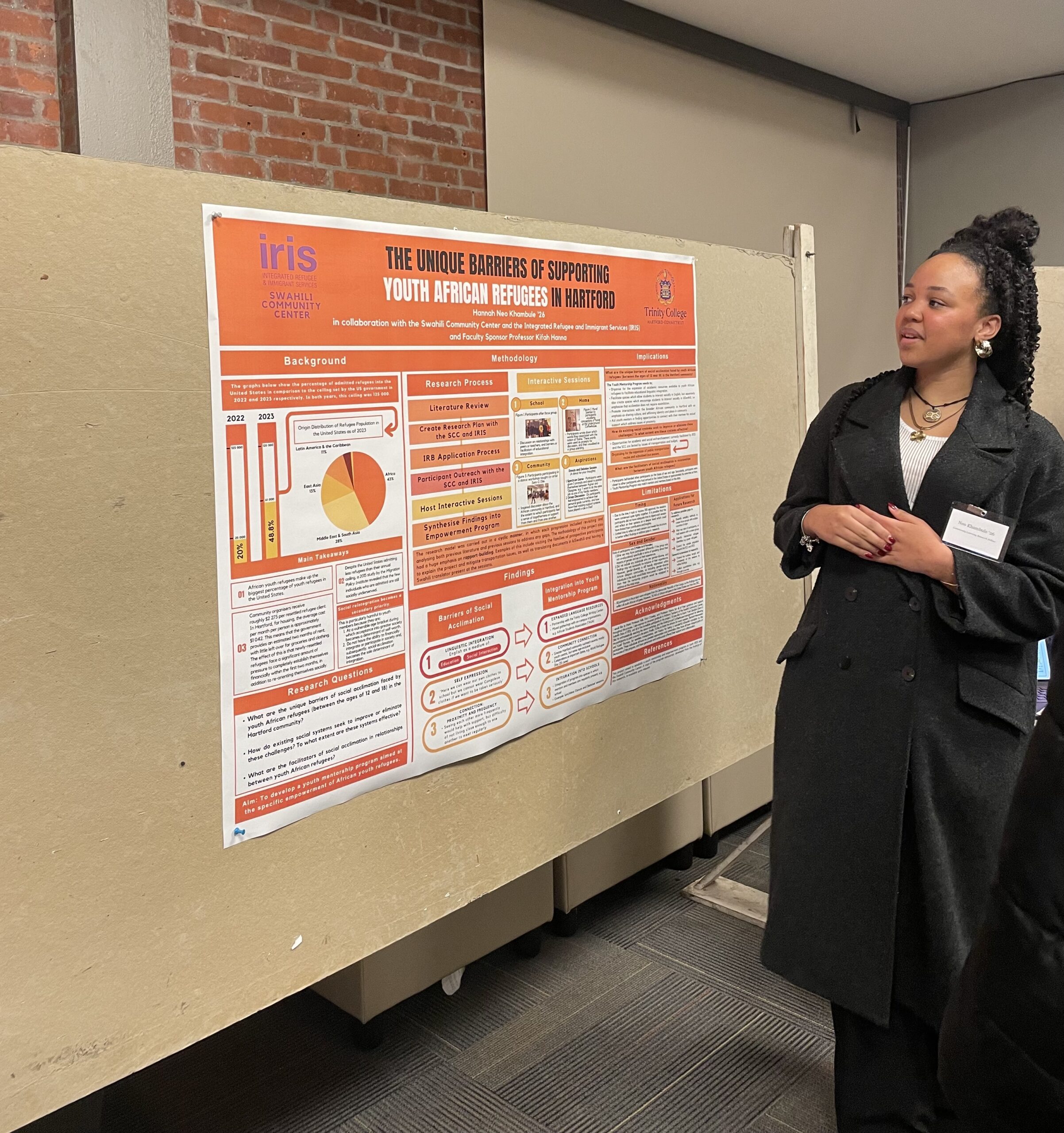
Abstract: As of May 2023, approximately 110 million people have been forcibly displaced worldwide. Fleeing persecution, conflict, and human rights violations, approximately a third of refugees resettled around the globe come from Africa. In the United States alone, a country meeting between 20-49% of their refugee resettlement goals in 2022 and 2023, African refugees make up 43% of the refugee population and form integral parts of African diasporic communities all around the country, including those in Connecticut. While community organizers in Hartford are committed to reintegrating these individuals both economically and socially into the community, economic integration inevitably takes precedence due to a strain on financial resources and, subsequently, social reintegration becomes a secondary priority. This project is premised on the argument that social integration is paramount to the successful resettlement of youth refugees specifically. To that end, I aimed to uncover the unique barriers which social integration from occurring so as to establish a youth empowerment program for two prominent community organizers: the Swahili Community Center and the Integrated Refugee and Immigrant Services (IRIS). My research focused on meeting with a group of 13 youth African refugees resettled in the Hartford community in a series of 4 interactive sessions. The sessions, spanning the themes of home, school, community, and aspirations, uncovered that the prominent barriers to social acclimation for youth African refugees in Hartford were linguistic integration, ability to self-express, and proximity to one another impacting connections to community. These findings demonstrate that an effective youth empowerment program at Hartford refugee community organisations such as the Swahili Community Center and IRIS would constitute an expansion of resources for English language acquisition, increased community outreach and presence through events, and the integration of empowerment opportunities in frequented spaces such as school. Efforts to address these barriers of social acclimation would increase the overall reintegration of refugees in Hartford and bring diasporic communities closer together.
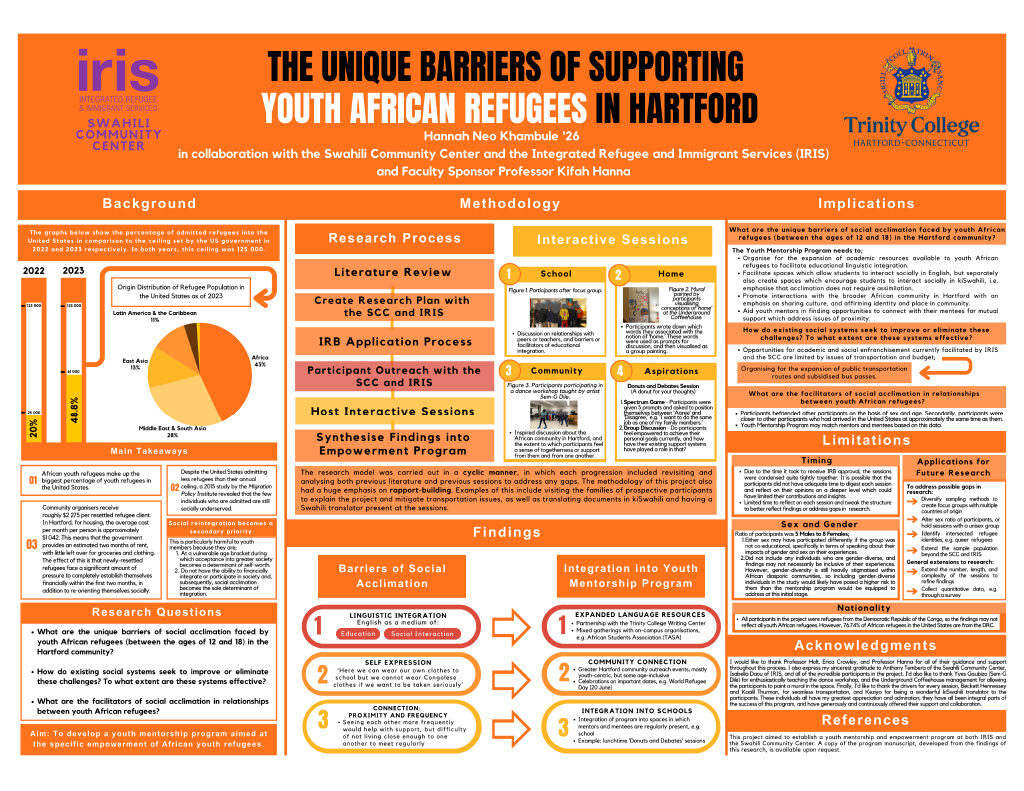
Visualizing Connecticut Food Scrap Pilot Programs: Participation, Representation, and Benefits
Shayla Whitaker ’25 and faculty sponsor Jack Dougherty with community partners at the Center for Leadership and Justice and CT DEEP
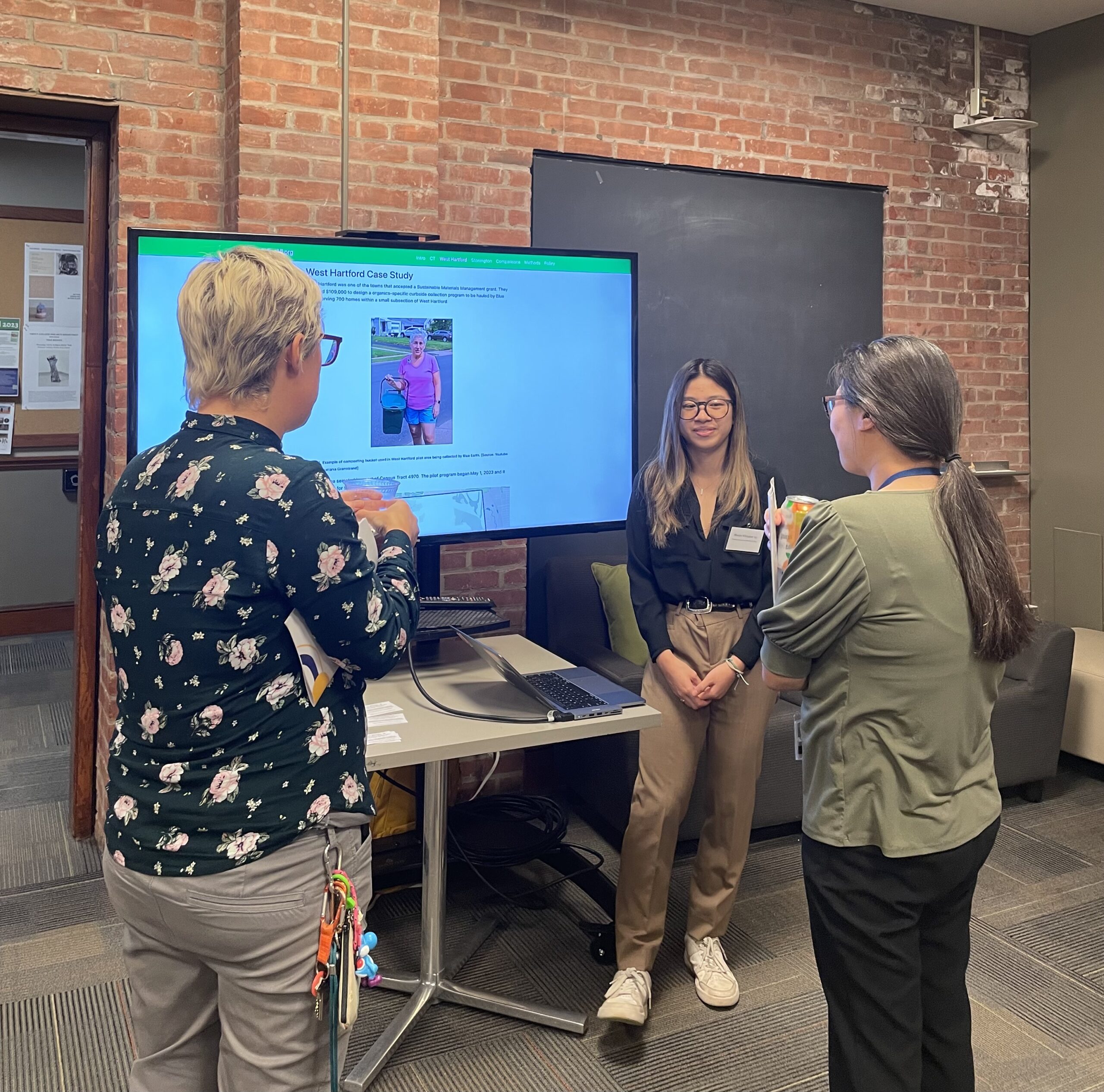
Abstract: We are in a trash crisis. A large portion of waste that goes to incinerators and landfills is food scraps, one of the heaviest types of waste and one of the largest sources of methane. In 2022-23, the Connecticut Department of Energy and Environmental Protection (CT DEEP) awarded Sustainable Materials Management grants to fund food scraps pilot programs by local governments to divert food scraps from the waste stream. Studying questions about representation, participation, and benefits of these programs gives us a better understanding of their strengths and weaknesses and potential implementation at a larger scale. Among 15 grant awards across the state, data collected from West Hartford and Stonington showed these two pilot programs represented wealthier and whiter areas, an average 46 percent participation rate (for West Hartford), and food scrap diversion rates ranging from 5 to 17 percent. Policy recommendations: DEEP should require towns to collect more uniform data, and make it accessible for the public to learn from these pilot programs.
To learn more about the Community Learning Research Fellows Program, visit http://cher.trincoll.edu/fellows or contact Instructor [email protected] and Director of Community Learning [email protected]
